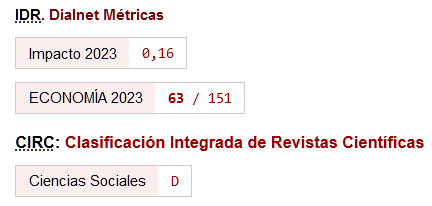The fundamental theoretical convergence between the Keynesian economic thought and the sociological structural-functionalism of Talcott Parsons
Keywords:
economic theory, sociological theory, Keynesianism, structural-funcionalism, theoretical convergenceAbstract
This research aims to demonstrate the fundamental theoretical convergence between the contributions from the keynesian economic thought and the sociological structural-functionalism of Talcott Parsons. To this end, we proceed to group and compare those contributions into three categories: teleology, epistemology and methodology. In view of the results, we conclude that, although the parsonian structural-functionalism shares the practical interest of understanding defended by both Keynes and postkeynesians economists, also it develops a hybrid epistemology, the "analytical realism", that is halfway between the "critical realism" that they defend and the "analytical formalism" advocated by neokeynesian authors. However, this situation is not transferred to the methodological field because Parsons is inclined, as Keynes and Post Keynesians, to rely on a logical-deductive methodology
Downloads
References
Bell, Daniel ([1973] 2001): El Advenimiento de la Sociedad Post-industrial, Madrid: Alianza Editorial.
Coddington, Alan (1976): "Keynesian Economics: The Search for First Principles", Journal of Economic Literature Nº 14 (4), pp. 1258-1273.
Davidson, Paul (1982): International Money and the Real World, Londres: Macmillan.
https://doi.org/10.1007/978-1-349-16679-4
Davidson, Paul (1994): Post Keynesian Macroeconomic Theory: A Foundation for Successful Economic Policies for the Twenty-first Century, Aldershot, Hants: Edward Elgar.
Garegnani, Pierangelo (1979): "Notes on Consumption, Investment and Effective Demand: a Reply to Joan Robinson", Cambridge Journal of Economics Nº 3 (2), pp. 181-187.
Gerhardt, Uta (2002): Talcott Parsons: an Intellectual Biography, Cambridge: Cambridge University Press.
https://doi.org/10.1017/CBO9780511527586
Habermas, Jürgen (1968): "Conocimiento e Interés" en Jiménez, Manuel (eds.) Jürgen Habermas. Conocimiento e Interés. Edmund Husserl. La Filosofía en la Crisis de la Humanidad Europea, Valencia: Uníversitat de Valencia, 1997, pp. 33-47.
Habermas, Jürgen (1981): La Teoría de la Acción Comunicativa II. Crítica de la Razón Funcionalista, Madrid: Taurus, 1992.
Hayek, Friedrich. A. von (1931a): "Reflections on the Pure Theory of Money of Mr. J.M. Keynes", Economica Nº 33, pp. 270-295.
https://doi.org/10.2307/2548035
Hayek, Friedrich A. von (1931b): Prices and Production, Nueva York: Augustus M. Kelley Publishers, 1967.
Hicks, John R. (1937): "Mr. Keynes and the Classics. A Suggested Interpretation", Econometrica Nº 5, pp. 147-159.
https://doi.org/10.2307/1907242
Hicks, John R. (1980-1981): "IS-LM: An Explanation", Journal of Post Keynesian Economics Nº 3 (2), pp. 139-154.
https://doi.org/10.1080/01603477.1980.11489209
Keynes John M. (1921): A Treatise on Probability, Londres: Macmillan and Co.
Keynes, John M. (1930): Tratado Sobre el Dinero, Madrid: Síntesis, 2010.
Keynes, John M. (1931): "The Pure Theory of Money. A Reply to Dr. Hayek", Economica Nº 34, pp. 387-397.
https://doi.org/10.2307/2549192
Keynes, John M. (1936): Teoría General de la Ocupación, el Interés y el Dinero, México: Fondo de Cultura Económica, 1965.
Keynes, John M. (1938): The Collected Writings of John Maynard Keynes. Volumen XIV, Cambridge: Royal Economic Society, 1978.
Lamo de Espinosa, Emilio (2001): "La Sociología del Siglo XX", REIS. Revista Española de Investigaciones Sociológicas Nº 96, pp. 21-49.
https://doi.org/10.2307/40184382
Lawson, Tony (1994): "The Nature of Post Keynesianism and its Links to other Traditions: a Realist Perspective", Journal of Post Keynesian Economics Nº 16 (4), pp. 503-538.
https://doi.org/10.1080/01603477.1994.11489998
Leijonhufvud, Axel (1968): On Keynesian Economics and the Economics of Keynes: A Study in Monetary Theory, Nueva York: Oxford University Press.
Moya Valgañón, Carlos (1965): "Talcott Parsons y la Vocación Actual de la Teoría Sociológica", Revista de Estudios Políticos Nº 143, pp. 149-164.
Parsons, Talcott (1932): "Economics and Sociology: Marshall in Relation to the Thought of his Time", The Quarterly Journal of Economics Nº 46 (2), pp. 316-347.
https://doi.org/10.2307/1883233
Parsons, Talcott (1936): "Pareto's Central Analytical Scheme" en Camic, Charles (eds.) The Early Essays, Chicago y Londres: University of Chicago Press, 1991, pp.133-150.
Parsons, Talcott (1937): La Estructura de la Acción Social. II Vols, Madrid: Ediciones Guadarrama, 1968.
Parsons, Talcott (1939): Actor, Situation and Normative Pattern. An Essay in the Theory of Social Action, Viena: Lit Verlag Münster, 2010.
Parsons, Talcott (1951): The Social System, Nueva York: The Free Press of Glencoe, 1964.
Parsons, Talcott (1978a): Action Theory and the Human Condition, Nueva York: Free Press.
Parsons, Talcott (1978b): Autobiografía Intelectual. Elaboración de una Teoría del Sistema Social, Bogotá: Ediciones Tercer Mundo.
Parsons, Talcott (1979-1980): "On Theory and Metatheory", Humboldt Journal of Social Relations Nº 7 (1), pp. 5-16.
Parsons, Talcott y Edward Shils (1951): Toward a General Theory of Action, Cambridge: Harvard University Press.
https://doi.org/10.4159/harvard.9780674863507
Phillips, Alban W. (1958): "The Relationship between Unemployment and the Rate of Change of Money Wages in the United Kingdom 1861-1957", Economica New Series Nº 25 (100), pp. 283-299.
https://doi.org/10.1111/j.1468-0335.1958.tb00003.x
Robinson, Joan (1933): The Economics of Imperfect Competition, Londres: Macmillan, 1969.
https://doi.org/10.1007/978-1-349-15320-6
Robinson, Joan (1953a): "Imperfect Competition Revisited", The Economic Journal Nº 63 (251), pp. 579-593.
https://doi.org/10.2307/2226447
Robinson, Joan (1953b): "The Production Function and the Theory of Capital", The Review of Economic Studies Nº 21 (2), pp. 81-106.
https://doi.org/10.2307/2296002
Robinson, Joan (1980): "Time in Economic Theory", Kyklos Nº 3 (2), pp. 219-229.
https://doi.org/10.1111/j.1467-6435.1980.tb02632.x
Robinson, Joan (1985): "The Theory of Normal Prices and Reconstruction of Economic Theory" en Feiwel, George R. (eds.) Issues in Contemporary Macroeconomics and Distribution, Albany: State University of New York Press, pp. 157-165.
https://doi.org/10.1007/978-1-349-06879-1_4
Samuelson, Paul A. (1943): "Full Employment After the War" en The Collected Scientific Papers of Paul A. Samuelson. Volumen 2, Boston: The MIT Press, 1991.
Samuelson, Paul A. (1947): Foundations of Economic Analysis, Cambridge y Londres: Harvard University Press, 1983.
Samuelson, Paul A. (1952): "Economic Theory and Mathematics: An Appraisal", The American Economic Review Nº 42 (2), pp. 56-69.
Samuelson, Paul A. (1969): "Classical and Neoclassical Theory" en Clower, Robert W. (ed.) Monetary Theory, Londres: Penguin Books.
Samuelson, Paul A. (1970a): "Maximum Principles in Analytical Economics. Nobel Memorial Lecture, 11 December, 1970" en Lindbeck, Assar (eds.) Nobel Lectures in Economic Sciences. 1969-1980, Singapur: World Scientific Publishing Co., 1992, pp. 62-77.
Samuelson, Paul A. (1970b): Curso de Economía Moderna. Una Descripción Analítica de la Realidad Económica, Madrid: Aguilar.
Samuelson, Paul A. y Robert M. Solow (1960): "Analytical Aspects of Anti-Inflation Policy", American Economic Review Papers and Proceedings Nº 50 (2), pp. 177-194.
Shackle, George L. S. (1972): Epistemics & Economics: A Critique of Economic Doctrines, Cambridge: Cambridge University Press.
Downloads
Published
How to Cite
Issue
Section
License
This licence allows third parties to share (copy and redistribute the material in any medium or format) and adapt (remix, transform and create from the material for any purpose, including commercial purposes), provided that authorship and first publication in this journal (The Journal, DOI of the work) is acknowledged, a link to the licence is provided, and it is stated whether changes have been made to the work.







